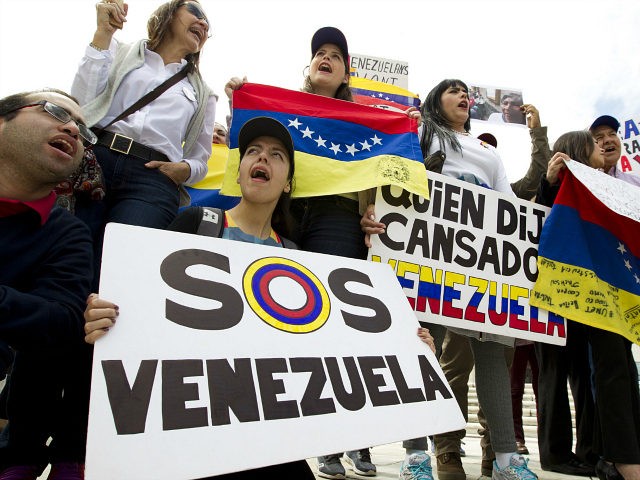Venezuela’s Catholic leadership has called for citizens to take up peaceful resistance against the socialist government this week, following a Supreme Court decision meant to grant the courts lawmaking power. The Vatican has also weighed in with a front-page feature in official publication L’Osservatore Romano.
Over the weekend, Venezuelan priests distributed a document to peregrines at Sunday Mass calling for civil disobedience against dictator Nicolás Maduro and his officials. The document declared, “it is time to ask oneself, respectfully and seriously, if civil disobedience, peaceful marches, the just demands to national and international public powers, and civic protests are valid and opportune.”
The recent Supreme Court decision stripping the National Assembly, the country’s legislative body, of lawmaking power was “morally unacceptable and reproachable,” the document concluded, warning that these moves may escalate violence in the volatile South American country.
Clarín notes that the document in question carried the seal of the Venezuelan Episcopal Conference, the national Vatican body, and was signed by the Archbishops of Caracas and Mérida, Jorge Urosa Savino and Baltazar E. Porras, respectively.
The clergymen were protesting the Supreme Court’s ruling decreeing that the opposition-held legislature was in “contempt” and thus held no legislative authority. The ruling went on to crown the Supreme Court the lawmaking body of Venezuela and begin proceedings to strip lawmakers of legislative immunity. The “contempt” charge comes from 2015 claims by Maduro and the ruling United Socialist Party of Venezuela (PSUV) that three opposition legislators had won their seats via fraud.
The Supreme Court issued “clarifications” of this ruling on Saturday, asserting that the National Assembly remained the legislative body of the country and upholding legislative immunity. As the Supreme Court had decreed the Assembly void as early as January 2016, however, this clarification did not acknowledge the legitimacy of this particular National Assembly, ruled by an opposition coalition known as the Democratic Unity Roundtable (MUD).
The Monday after the clarification, Archbishops Savino and Porras issued statements independently to protest the blocking of legislators to prevent them from entering the National Assembly building, asserting that the breach was made and protest was necessary.
“The block on the National Assembly persists. I am still concerned that the country is in an exceptional state regarding the economy, for the past year,” Savino said. “This is not normal.” He reiterated that Venezuela was a “dictatorship.”
Porras dismissed the clarifications, calling them “cosmetic touches that do not resolve the situation at all because the measures that limit the National Assembly as an autonomous power persist and confuse the population.”
On Wednesday, the Vatican’s L’Osservatore Romano ran a cover story titled “Venezuela in the Abyss,” detailing the violence against peaceful opposition in Venezuela and the prevention of legislators from entering their offices in the National Assembly.
The clarifications to the Supreme Court ruling did not prevent Maduro from ordering the Bolivarian National Guard (GNB) and, say some protesters, violent socialist gangs from attacking protesters and legislators. On Tuesday, the GNB used tear gas and rubber bullets to attack duly elected members of the National Assembly who attempted to enter the building.
Chavista thugs also assaulted legislators; in one instance on Monday, a thug bludgeoned a legislator with a large stick, breaking open his eyebrow and sending him to the emergency room needing 56 stitches.
On Wednesday, MUD legislators finally succeeded in entering the National Assembly and getting to work, beginning impeachment proceedings against every Supreme Court justice for issuing the unconstitutional ruling. While the 1999 Venezuelan constitution grants the National Assembly the power to impeach and remove Supreme Court justices, there is no guarantee Maduro’s government will abide by a formal ouster of these justices.
Venezuela’s Catholic clergy have long expressed support for the anti-Chávez and anti-Maduro opposition. The Vatican, however, has taken a more measured approach, with Pope Francis welcoming Maduro to the Vatican in October and ordering Vatican mediation of the dispute.
Those peace talks collapsed as the opposition noted that Maduro appeared to be using the talks to limit opposition activity while continuing to use violence against them.

COMMENTS
Please let us know if you're having issues with commenting.